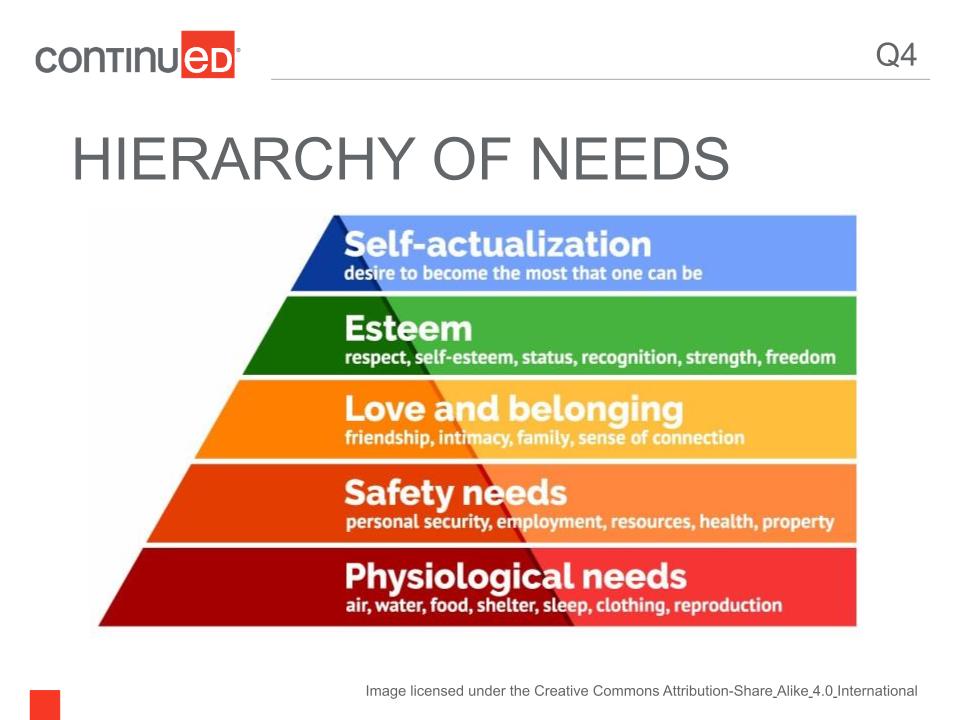Question
What is Maslow's hierarchy of needs?
Answer

Figure 1. Maslow’s hierarchy of needs.
As you can see in figure 1, there are five levels in this pyramid. Maslow felt that all people, no matter what their age, go through this hierarchy of needs that motivates our behavior. We want to fulfill and meet these needs before moving on to more advanced needs.
Psychological Needs
The basic physiological needs make up the foundation of the pyramid. These are the strongest human needs. Without food, water, shelter, and clothing we cannot survive. They are the foundation. Without them, everything crumbles and falls. If you have ever been hungry, you know that you cannot think about anything else. If you have ever been homeless, you know you are not thinking about the meaning of life, you are thinking about where you are going to sleep tonight. When all of these basic physiological needs are met, only then can we proceed to the next stage, which is the stage of safety.
Safety Needs
We all have a need to feel safe in our lives. Some of the basic safety needs that Maslow identifies are those for personal security, having a job, having a home that is yours, feeling secure, having health insurance, and having your health. Together, the safety needs and the physiological needs make up what he calls the basic needs. Only when those two levels are satisfied can we move up to the next level of needs, which is the need for love and belonging.
Love and Belonging
We all want to overcome feelings of loneliness and alienation through giving and receiving love and affection and a sense of belonging. This can be achieved through friendships, romantic attachments, family, community groups, churches, and religious organizations. All of those help you gain a sense of being part of something. When the needs of these bottom three levels are met and satisfied, then we can get to the esteem level.
Esteem
We all have a need to accomplish things and have those accomplishments be recognized. We need to sense that we are valued by other people. Maslow talked about the need for respect from others and also self-esteem. This includes a sense of dignity and a sense of achievement and mastery within ourselves. These needs can be met through our professional jobs, through our studies, by being on a team, or through hobbies. People who can satisfy these needs of esteem by getting recognition from others and achieving good self-esteem tend to feel confident in their abilities. Those who lack self-esteem and who lack respect from others can develop feelings of inferiority.
Self-Actualization
This brings us to the top of our pyramid, which Maslow says most people do not reach. When all these other levels have been met, only then are the needs for self-actualization activated. Maslow described self-actualization as a person's need to be and do what they were born to do. For example, a musician must make music and an artist must paint. The person feels on edge and restless, but not really sure why. When we know we are hungry, we know what it is. When we are restless because we want a loving, romantic relationship, we know what we want. With self-actualization, we may not be sure what it is that we need yet, but it is that desire to feel fulfilled. This is the highest level of the hierarchy and involves seeking personal growth. Maslow said this is the desire to accomplish everything that one can, to become the most that one can be.
Why do we need to know about this? I think it is because we often tend to look at a child's behavior and not think about what is happening in the background. Are they hungry? Is their home safe? We need to really think about whether all the basic needs of the child are being met. If a child is hungry and comes to preschool and is misbehaving or is not focused and on task, it may not be that this is a problem child, this might be a really hungry child. We do not know. That is sadly a scenario that may be more common than we like to think.
This Ask the Expert is an edited excerpt from the course, Social-Emotional Development Theories and the Early Childhood Classroom, presented by Miriam Eckstein-Koas, MS, SpEd.
